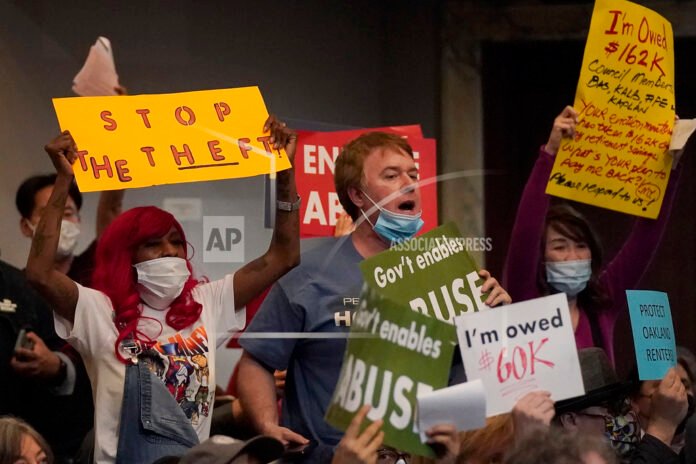
EDITORS/NEWS DIRECTORS:
Eviction filings are far above average in some cities across the country as pandemic relief disappears and inflation causes rents to spike. According to the latest data from the Eviction Lab, filings in several cities are running as much as 50% above pre-pandemic averages. Those numbers are especially stark, given that many tenants experienced a reprieve during the pandemic when eviction moratoriums were in place and billions of dollars in federal rental assistance was plentiful. Most of the moratoriums are now gone, and many of the larger cities have exhausted their rental assistance.
___
READ AP’S STORY
Eviction filings are 50% higher than they were pre-pandemic in some cities as rents rise
___
WHAT ARE THE EVICTION RATES IN YOUR STATE AND NEARBY CITIES?
A good place to start when tracking eviction filings is the Eviction Lab at Princeton University. It has tons of data on filings nationwide and specifically tracks filings in 10 states and 34 cities:
— STATES
Connecticut, Delaware, Indiana, Minnesota, Missouri, New Mexico, Pennsylvania, Rhode Island, Virginia, Wisconsin
— CITIES
Arizona: Phoenix
Connecticut: Bridgeport, Hartford
Delaware: Wilmington
Florida: Gainesville, Jacksonville, Miami-Fort Lauderdale, Tampa
Indiana: Indianapolis, South Bend
Louisiana: New Orleans
Massachusetts: Boston
Minnesota: Minneapolis-Saint Paul
Missouri: Kansas City, St. Louis
Nevada: Las Vegas
New York: New York City
New Mexico: Albuquerque
Ohio: Cincinnati, Cleveland, Columbus
Pennsylvania: Philadelphia, Pittsburgh
Rhode Island: Providence
South Carolina: Charleston, Greenville
Tennessee: Memphis, Nashville
Texas: Austin, Dallas, Fort Worth, Houston
Virginia: Richmond
Wisconsin: Milwaukee
— If your state or city is not represented, you can also contact housing or homeless advocacy groups in your area and visit your local housing court, which should be able to provide you with data.
___
WHO IS BEING EVICTED?
Once you have a handle on eviction filings in your area, seek out tenants who are facing eviction or have been evicted. One option is spending a morning in your local housing court. The cases move rather quickly, and there is a good chance you will find tenants either waiting for their cases to come up or leaving court after a ruling.
Beyond that, housing advocates are a great source for connecting reporters with tenants. Sometimes, they have a table outside housing court. You should also try to contact the landlord for a particular case or a real estate association in your area.
You can also reach out to advocates such as your local legal aid office and they can put you in touch with a family facing eviction.
It is also worth contacting housing experts who study the issue, like The Joint Center for Housing Studies at Harvard University, to better understand who is being evicted and the impacts of being evicted.
___
WHY ARE PEOPLE BEING EVICTED?
Among the drivers for increasing eviction filings are rising rental prices, a shortage of affordable housing and the end to many tenant protections put in place during the pandemic.
There are scores of sites tracking rental prices around the country, and one of the most reliable is the real estate company Zillow.
As for the state of housing, a good place to start is the National Low Income Housing Coalition, which puts out reports on the state of housing including The Gap. It shows the number of affordable and available rental homes per 100 extremely low income renter households in each state.
The coalition is also a good source to provide details on the $46.5 billion in federal Emergency Rental Assistance that helped tenants pay rent during the pandemic. Another good source is the Treasury Department, which oversees the program and puts out reports on how much of these funds states and cities have spent or allocated.
___
WHAT IS BEING DONE TO HELP TENANTS?
With much of the pandemic assistance spent and protections like eviction moratoriums mostly ended, there is much less help out there for tenants. But it would be wrong to assume there is no relief.
Check with your city council to see if ongoing tenant protections, such as right to counsel, were put in place during the pandemic or are being considered.
It is also worth seeing if your state’s legislature is considering any housing legislation this session that either provides tenant protections or makes it easier to build more affordable housing.
And lastly, there are many bills in Congress aimed at addressing the housing crisis. But with Republicans in control of the U.S. House, there is less optimism that anything will get done. On top of that, housing advocates warn that a deal reached in Congress to suspend the debt limit through 2025 means there could be significant cuts in affordable housing and homelessness programs.
___
BC-US–Housing-Eviction Rising-Localize It
Jun 20, 2023 11:13 AM – 807 words
By MICHAEL CASEY Associated Press
Eds: UPDATES: With AP Photos.
___
Cover Photo: Chris Moore, middle, of the East Bay Rental Housing Association board, holds up signs with others during a Oakland City Council special community and economic development committee at City Hall in Oakland, Calif., Tuesday, April 11, 2023. Some landlords have gone without rental income for more than three years after Oakland, California approved an eviction moratorium in March 2020. (AP Photo/Jeff Chiu)


